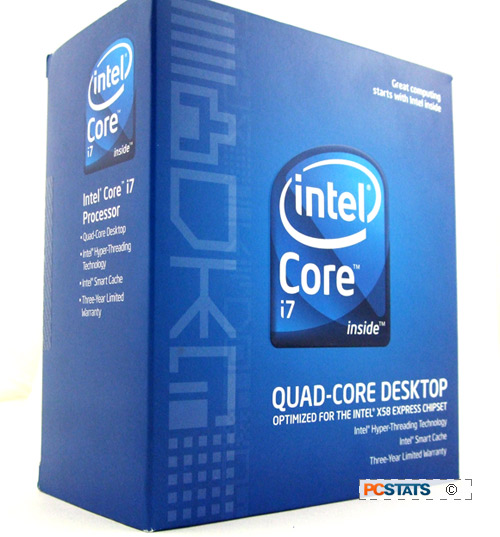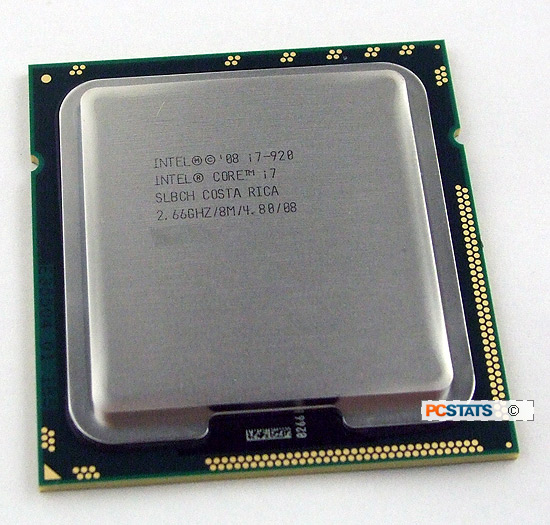It's a given that the Core i7 920 is a beast of a
processor. At 2.66GHz, with four cores, a massive 8MB cache and the ability to
use HyperThreading, this processor is filled with incredible potential that even
AMD's fastest quad-cores can't match.

However, that's also the biggest flaw of the Core i7:
trying to find uses for all these cores.
While for the sake of testing we include a lot of
benchmarks that scale well to multiple cores, the important everyday ones
(Sysmark) and the fun ones (Crysis and Fear) don't actually fall in favor of the
$346 CDN ($280 USD, £170 GBP) Core i7 920 processor.
Instead it's Intel's lean and mean $234 Core 2 Duo E8500 that takes the lead in
these tests.
Despite big pushes from AMD and Intel towards multi-core processors, desktop parallelism
doesn't seem be gaining traction in the hardware community as quickly as the
processor giants might like.
There are still scores of developers and programmers who
won't support multi-threading until there's a greater install base, and
conversely a huge amount of users who won't go quad-core until there are
applications that take advantage of it.
Does this mean the Intel's Core i7 920 is a dud? Not by a
long shot, but it does limit who it will appeal to. When the processor launched
in November it was something that only the truly rich could appreciate, since
the total cost to own a Core i7-based system was so expensive.
Getting an Intel X58 Express motherboard, triple-channel
memory and the Core i7 920 processor used to run over $1000.
Half a year later and the story has changed. Although
Intel doesn't have any real competition from AMD that would pressure it to lower
the price of the Core i7 920, motherboard manufacturers and memory makers don't
enjoy such security.
 The price on Intel X58 Express chipset
motherboards have come from the $500 mark down to the $200 mark, and the price
of triple-channel DDR3 memory kits have dropped like a rock.
The price on Intel X58 Express chipset
motherboards have come from the $500 mark down to the $200 mark, and the price
of triple-channel DDR3 memory kits have dropped like a rock.
The video card market is tanking as well, which is bad
for NVIDIA and ATI, but great for enthusiasts like you. With great gaming
videocards like the Radeon HD 4890 approaching the $200 mark, it's easy to
make room in the budget for a Core i7 920 processor.
If the stock 2.66GHz performance of the Core i7 920 isn't
enough, it can easily be overclocked to some pretty amazing speeds.
When paired up with a top-end motherboard like the MSI
Eclipse Plus, it was possible to take our Core i7 920 up to a blistering 4.1GHz.
At that speed there simply isn't a processor in production that compares to it,
it's the fastest CPU money can buy.
In the end the Nehalem architecture isn't quite the
universal recommendation that Intel's previous Conroe (Core 2 Duo) architecture
was.
While the Core 2 Duo was universally faster than every
Intel processor that came before it, the Core i7 still has a ways to go until it
can best processors like the Intel Core 2 Duo E8500 in conventional applications
that don't scale well on multiple cores.
If your computing is primarily single-threaded, the Core
i7 920 may not be the processor for you. But for enthusiasts and overclockers
looking for a worthy upgrade path, or artists who do a lot of 3D raytracing and
video editing, Intel's Core i7 920 is an easy choice.

Related Articles
Here are a few other articles that you might enjoy as
well...
- Intel Core 2 Duo E6600 2.4GHz Processor Review
- AMD Athlon64 X2 4800+ 65nm Processor Review
- Intel Pentium M 740 1.73GHz socket 479 Processor
Review
- AMD Sempron 3600+ 2.0GHz Socket AM2 Processor Review
- Intel Pentium D 940 3.2GHz Dual Core Processor
Review
